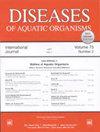Cytology in cnidaria using Exaiptasia as a model.
IF 1.1
4区 农林科学
Q3 FISHERIES
引用次数: 0
Abstract
A need exists for additional methods to examine cnidaria at the cellular level to aid our understanding of health, anatomy, and physiology of this important group of organisms. This need is particularly acute given that disease is emerging as a major factor in declines of ecologically important functional groups such as corals. Here we describe a simple method to process cnidarian cells for microscopic examination using the model organism Exaiptasia. We show that this organism has at least 18 cell types or structures that can be readily distinguished based on defined morphological features. Some of these cells can be related back to anatomic features of the animal both at the light microscope and ultrastructural level. The cnidome of Exaiptasia may be more complex than what is currently understood. Moreover, cnidarian cells, including some types of cnidocytes, phagocytize cells other than endosymbionts. Finally, our findings shed light on morphologic complexity of cell-associated microbial aggregates and their intimate intracellular associations. The tools described here could be useful for other cnidaria.以 Exaiptasia 为模型的刺胞动物细胞学。
我们需要更多从细胞层面研究刺胞动物的方法,以帮助我们了解这一重要生物群体的健康、解剖学和生理学。鉴于疾病正在成为珊瑚等具有重要生态功能的生物群体衰退的主要因素,这一需求尤为迫切。在这里,我们介绍了一种利用模式生物 Exaiptasia 处理刺胞动物细胞进行显微镜检查的简单方法。我们的研究表明,这种生物至少有 18 种细胞类型或结构,可以根据确定的形态特征很容易地加以区分。其中一些细胞在光学显微镜和超微结构水平上都可以与动物的解剖特征联系起来。Exaiptasia 的刺胞体可能比目前所了解的更为复杂。此外,刺丝胞(包括某些类型的刺丝胞)会吞噬内共生体以外的细胞。最后,我们的发现揭示了细胞相关微生物聚集体的形态复杂性及其细胞内的密切联系。这里描述的工具可能对其他刺胞动物有用。
本文章由计算机程序翻译,如有差异,请以英文原文为准。
求助全文
约1分钟内获得全文
求助全文
来源期刊

Diseases of aquatic organisms
农林科学-兽医学
CiteScore
3.10
自引率
0.00%
发文量
53
审稿时长
8-16 weeks
期刊介绍:
DAO publishes Research Articles, Reviews, and Notes, as well as Comments/Reply Comments (for details see DAO 48:161), Theme Sections and Opinion Pieces. For details consult the Guidelines for Authors. Papers may cover all forms of life - animals, plants and microorganisms - in marine, limnetic and brackish habitats. DAO''s scope includes any research focusing on diseases in aquatic organisms, specifically:
-Diseases caused by coexisting organisms, e.g. viruses, bacteria, fungi, protistans, metazoans; characterization of pathogens
-Diseases caused by abiotic factors (critical intensities of environmental properties, including pollution)-
Diseases due to internal circumstances (innate, idiopathic, genetic)-
Diseases due to proliferative disorders (neoplasms)-
Disease diagnosis, treatment and prevention-
Molecular aspects of diseases-
Nutritional disorders-
Stress and physical injuries-
Epidemiology/epizootiology-
Parasitology-
Toxicology-
Diseases of aquatic organisms affecting human health and well-being (with the focus on the aquatic organism)-
Diseases as indicators of humanity''s detrimental impact on nature-
Genomics, proteomics and metabolomics of disease-
Immunology and disease prevention-
Animal welfare-
Zoonosis
文献相关原料
| 公司名称 | 产品信息 | 采购帮参考价格 |
|---|
 求助内容:
求助内容: 应助结果提醒方式:
应助结果提醒方式:


